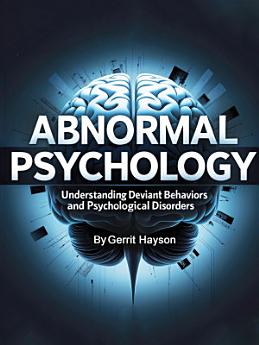Abnormal Psychology: Understanding Deviant Behaviors and Psychological Disorders
About this ebook
The concept of psychological abnormality is far from straightforward. Unlike physical ailments where broken bones or infections can be objectively measured and diagnosed, mental health conditions exist along continuums of human experience. What one culture considers abnormal behavior, another might view as spiritual enlightenment or artistic expression. What one historical period pathologized, another might celebrate as individuality or creativity.
Consider the case of a woman who believes she can communicate with deceased relatives. In certain cultural contexts, this ability might be revered as a spiritual gift, positioning her as a valued intermediary between worlds. In a Western clinical setting, however, such beliefs might be interpreted as symptoms of psychosis or delusional thinking. This example illustrates the profound influence of cultural context on our understanding of mental health and psychological normalcy.







